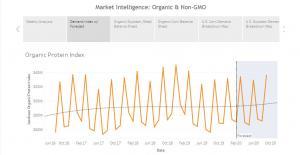With conventional grain prices under pressure, the question for organic grain merchandisers is will this negative sentiment spill over into organic corn price and organic soybean prices. The focus for traders and ingredient buyers should be how this shock to the system will affect consumer buying habits.
In the short-term, consumers are still making purchases and are focusing on staples as opposed to consumer discretionary items. This means that while the malls around the US are experiencing a lack of traffic, big box stores such as Costco, Walmart, and Target are continuing to see heavy traffic. Consumers are stocking up on cleaning items as well as frozen and canned food. With airline travel likely greatly reduced until the peak of the coronavirus hits the US, food to purchase while eating at home should continue to gain traction.
How will a Weaker Dollar Affect Organic Grains?
Approximately 70% of the organic soybean/meal is imported into the US while 30% of the organic corn is imported. This should theoretically make the price of organic grains that are imported more expensive. But this is not the case. The Indian Rupee has declined relative to the greenback, and so has the Argentinian Peso. Additionally, most of the organic grains that are imported are priced in dollars and not the Rupee or the Peso, which likely means the decline in the value of the greenback will have little effect on organic grain prices.
How Will Chicken, Egg and Dairy Demand Perform?
While conventional prices should remain stable despite a drawback in economic growth due to the coronavirus, organic products might feel a pitch if there is a downturn. Most of the consumers of organic chicken, eggs and dairy (proteins) are under the age of 50. What remains to be determined is whether this group, especially those who have young children, will be willing to forego organic proteins in lieu of another discretionary item (like clothing).
The Jacobsen expects organic protein (dairy, eggs, and chicken along with turkey) to continue to rise during the balance of 2020, despite the effects of the coronavirus. If this led into a recession, in 2021 then all bets are off, and demand should moderate.



